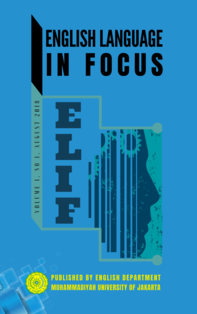Metaphor Analysis on Students’ English Poems
DOI:
https://doi.org/10.24853/elif.1.1.1-8Keywords:
mystical love metaphor, semantic perspective, metaphor analysisAbstract
This study aims to know the students’ ability in using a metaphor for their English poems writing. Through the poem, the poet uses the metaphor to sharpen the ideas as the media to express the feeling, thought and life experience. In this case, love poems were written by the fifth-semester students using metaphor. This study uses a qualitative method to gain a description of the metaphor analysis in students’ English love poems. In research findings, the writer found that the students use several kinds of metaphor in semantic perspective and the mystical love metaphor represented in their poems.References
Gill, R. (1995). Mastering English Literature. London: Macmillan International Higher Education.
Jaberi, S., Ho-Abdullah, I., & Vengadasamy, R. (2016). Mystical Love Metaphors: A Cognitive Analysis of Sohrab Sepehri’s Poetry. GEMA Online Journal of Language Studies, 16(1), 143–156.
Kamberi, L. (2013). Using Metaphors in Language Teaching and Learning. European Journal of Research on Education, 2(2), 92–97. Retrieved from http://iassr.org/journal
Moody, H. L. B. (1971). The Teaching of Literature. Bristol: Longman.
Parera, J. D. (2004). Teori Semantik. Jakarta: Erlangga.
Downloads
Published
2018-08-29
Issue
Section
Articles
License
Authors who publish with this journal agree to the following terms:
- Authors retain copyright and grant the journal right of first publication with the work simultaneously licensed under a Creative Commons Attribution License that allows others to share the work with an acknowledgment of the work's authorship and initial publication in this journal.
- Authors can enter into separate, additional contractual arrangements for the non-exclusive distribution of the journal's published version of the work (e.g., post it to an institutional repository or publish it in a book), with an acknowledgment of its initial publication in this journal.
- Authors are permitted and encouraged to post their work online (e.g., in institutional repositories or on their website) before and during the submission process, as it can lead to productive exchanges, as well as earlier and greater citation of published work (See The Effect of Open Access).


